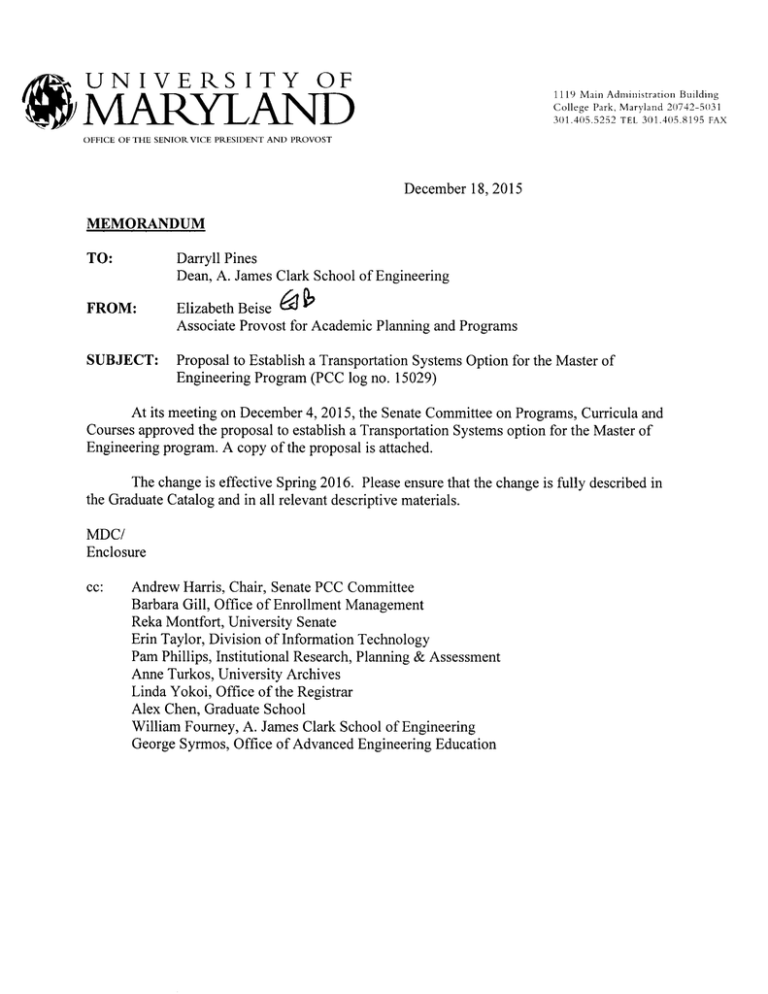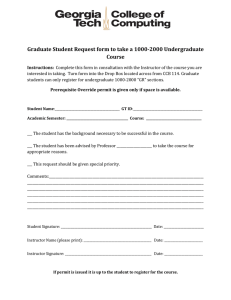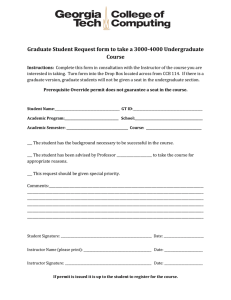MARYLAND U N I V E R S I T Y...
advertisement

UNIVERSITY
OF
1119 M a i n A d n u i i i s t r a t i o n B u i l d i n g
College Park, M a r y l a n d 20742-5(131
301.405.5252 TEL 301.405.8195 FAX
MARYLAND
OFFICE OF THE SENIOR V I C E PRESIDENT AND PROVOST
December 18,2015
MEMORANDUM
TO:
Darryll Pines
Dean, A. James Clark School of Engineering
FROM:
Elizabeth Beise
Associate Provost for Academic Planning and Programs
SUBJECT:
Proposal to Establish a Transportation Systems Option for the Master of
Engineering Program (PCC log no. 15029)
At its meeting on December 4, 2015, the Senate Committee on Programs, Curricula and
Courses approved the proposal to establish a Transportation Systems option for the Master of
Engineering program. A copy of the proposal is attached.
The change is effective Spring 2016. Please ensure that the change is fully described in
the Graduate Catalog and in all relevant descriptive materials.
MDC/
Enclosure
cc:
Andrew Harris, Chair, Senate PCC Committee
Barbara Gill, Office of Enrollment Management
Reka Montfort, University Senate
Erin Taylor, Division of Information Technology
Pam Phillips, Institutional Research, Planning & Assessment
Anne Turkos, University Archives
Linda Yokoi, Office of the Registrar
Alex Chen, Graduate School
William Fourney, A. James Clark School of Engineering
George Syrmos, Office of Advanced Engineering Education
T H E UNIVERSITY M A R Y L A N D , C O L L E G E P A R K
P R O G R A M / C U R R I C U L U M / U N I T PROPOSAL
PCCLOCiNO.
•
Pkaso email tiie rest oftlic propesal as an MSVVord atiaehmcni
»
t'k.i,sc siibinil (111- sigllCi! tbriii lu I I K ' Otlicc at tiw A>s<!cl;iic I'rovosl
for Academic I'iaaniiig imd Programs. 1 1 1 9 Mara Adoiiaisirdtion Btiildini, Ciiinpus.,
Colkge/Schoo!: E N C R
Please also add Cotlegc/Schooi Unit Code-I irsf 8 digits 01320101
Dt-parlinent/Prograni; OflkeofAtiviincetl F'-nginfcring Education
I'lease also add Departmetit/Program lliiit (.'ode-Last 7 digits: 1322302
Type o f Action (choose one):
•\'
Curriculum change {iticluding intbrmal specializations)
New Professional Studies award iteration
• i CtiiTicuium change for an LEP Program
New M i n o r
:,J
V Request to create an online version o f a n existing
program
f .•'mvvnv.'Vv-
Summary o f Proposcif A c l i o i i ;
Creation o f a n o n l i n e academic option in Tran.sportation Systems to the existing Professional Master o f Engineering;
Program (as M E T S ) through the Office o f Advanced Engineering Education.
I)«partmcntal/linit Contsjct Peison for Proposal: Ali Hagliaiii
A P P R O V A L SK.iNA'l l i R L S 1. Deparimenl Committee Chair: A l i Hugtiani
2. Depailment Chair: (k'orgc Syrmos
CoHege'.School PCC C'hair: .icnna Bucei
4. Dean;
3"
Dean of the Graduate School (if required)
6 . Chair, Senate PCC:
7. University Senate Chair (if required):
8. Senior Vice President and Provost:
I.
Overview and Rationale
Established in 1994, the Office of Advanced Engineering Education (OAEE) in the Clark School of Engineer
responsible for lifelong learning programs designed for working engineers and technical professionals. OAE
both credit and non-credit programs, but our primary offerings are the Master of Engineering degree and the
Post-Baccalaureate Graduate Certificate in Engineering degree. We refer to these degree programs as the
Professional Master of Engineering (ENPM) Program and the Graduate Certificate in Engineering (GCEN) Pro
Master of Engineering degree is awarded with completion of ten courses (30 credits) and no thesis/research
scholarly paper, or comprehensive exam are required. Each academic option has its own set of course requ
The GCEN Program was developed to serve as a more highly focused area of study. It requires the comple
specific courses (12 credits) by academic option. There are currently over 500 students in our programs with
2000 graduates. Students take classes on campus, at regional education centers throughout Maryland, and
programs are offered online. Enrollments have been averaging 55% on campus and 45% distance/online for
few years.
OAEE currently offers eighteen academic options under these two programs
(http://advancedeneineering.umd.edu/degrees-certificates). Academic options were originally versions of th
Master of Science programs in each academic department (i.e. Aerospace, Mechanical, Electrical, etc.). How
the need grew for more interdisciplinary programs, we began working with research institutes and centers in
Clark School to develop and offer programs to meet the needs of the engineering/technology community. W
developed niche academic options in Sustainable Energy, Project Management, Robotics, Energetic Concep
Software, Reliability, Fire Protection, Regulatory Science, and Cybersecurity. In 2003, we began offering our
online to give national and worldwide access to the outstanding programs available at Maryland.
We propose the creation of a Transportation Systems academic option in the Professional Master of Engine
Program that will be fully online and will be a complement to the options we currently offer and the research
being done in the Department of Civil and Environmental Engineering, the National Transportation Center, and th
for Advanced Transportation Technology.
II.
Program Audience
Based on our internal review, which included discussions with faculty, research sponsors, experts in indus
government as well as evaluation of competing higher education institutions, we believe there is a high-dem
this academic option. Transportation is an evolving field and most knowledge and expertise required for a
career in transportation systems engineering is only available through graduate programs. The University o
Maryland's Department of Civil and Environmental Engineering (CEE) has an immensely successful educat
research program in transportation as evidenced by the research activities currently underway in the Center
Advanced Transportation Technology (CATT), the federally-funded National Transportation Center (NTC) a
recently funded project by ARPA-E entitled "Integrated, Personalized, Real-time Traveler Information and In
Technology for Optimizing Energy Efficiency in Multimodal Transportation Systems." The CEE graduate pr
transportation is one of the top three in the nation and very unique in terms of the breadth and depth of the
transportation that it covers. There is a high demand for employment for transportation professionals in the
nationwide, and across the globe. Offering an online graduate program will expand our reach and allow us
qualified students who demand a high quality graduate education. The target audience is adults who have
at least a Bachelor's degree in engineering or science. This program will be of interest to working engineer
professionals, as well as recent graduates, who desire a career in transportation systems, as an opportunit
their knowledge and careers. We expect that due to the high demand for employment, the strength and repu
the Clark School of Engineering and the CEE graduate program in transportation, the research activities at
the NTC, and our highly effective distance learning capabilities, we will provide an outstanding educational o
engineers and technical professionals regionally, nationwide, and across the globe.
Full admission as a degree seeking student requires the following:
• A bachelor's degree, with a GPA of 3.0 or better, in engineering or science from an accredited institution
• Three letters of recommendation are required for the ENPM Program
• Applicants who have a GPA between 2.7 and 3.0 could be admitted provisionally which requires that they
earn a grade of B or better in their first two to four courses in order to gain full admission. Failure to do
result in dismissal from the program.
III.
Program Administration
OAEE provides administrative oversight to all academic options in the ENPM Program, including student s
faculty support, proctoring, admissions, and academic outreach. In addition, OAEE works with faculty to dev
courses and programs that meet the needs of the engineering/technology communities. OAEE researches
needs, meets with private and public sector leaders, attends various professional society and technology co
to learn about possible program development areas. For each academic option there is an identified academ
advisor/content matter expert who advises OAEE and our students on curriculum matters. For the tradition
academic options (i.e. aerospace, bioengineering, mechanical, etc.) an advisor is assigned by that departme
For our interdisciplinary programs, the Chair/Director of the primary department/research center/institute assig
academic advisor. These interdisciplinary areas also have curriculum committees that review student and fa
performance, course content, and curriculum development. As with all programs in OAEE, curriculum and a
oversight for the core and elective courses will be through a faculty advisory committee that will collaborate
OAEE Executive Director, making sure that both commitment to support this new specialization and academ
excellence are in place. Evaluation and assessment of this option will be performed by the faculty of Civil an
Environmental Engineering, more specifically a faculty member in the National Transportation Center group
first academic advisor.
Professor All Haghani will be the first academic advisor and will work with the OAEE Executive Director to
academic integrity is met (see the attached Assessment Plan approved for all OAEE academic options). Th
specialization will comply with all UMCP policies and requirements for graduate admission, time of study, an
graduation requirements.
IV.
Curriculum
The curriculum identified represents the beginning of what will be an evolving program that will continue to o
latest developments in this rapidly changing and critically important field of study.
Students in the online Professional Master of Engineering in Transportation Systems Program will complete 10
30 credits. Students must also meet the prerequisites for any course they wish to take. The curriculum will be
that students could complete the curriculum in two academic years if pursuing the degree full-time.
V.
Budget Resources
The Office of Advanced Engineering Education is a self-support unit and the Professional Master of Enginee
Programs are administered through its resources.
VI.
Master of Engineering Courses
Courses have already begun to be webcast through the DETS office in the Clark School of Engineering in p
this new offering. We will request the creation of a new online course section to correspond to this new spec
potentially TSO"* - under which students would take these courses.
o
o
o
o
o
o
•
ENCE 670 Highway Characteristics Measurements (3 credits)
Prerequisite: Permission of Instructor.
The study of the fundamental traits and behavior patterns of road users and their vehicles in tr
The basic characteristics of the pedestrian, the driver, the vehicle, traffic volume and speed, st
flow and intersection operation, parking, and accidents,
ENCE 672 Regional Transportation (3 credits)
Prerequisite: Permission of Instructor
Factors involved and the components of the process for planning statewide and regional
transportation systems, encompassing all modes. Transportation planning studies, statewide
models, investment models, programming and scheduling,
ENCE 673 Transportation (3 credits)
Prerequisite: Permission of Instructor.
The contemporary methodology of urban transportation planning. The urban transportation pla
process, interdependence between the urban transportation system and the activity system, u
travel demand models, evaluation of urban transportation alternatives and their implementatio
677 Transportation Analysis (3 credits)
Prerequisite: Permission of Instructor.
Fundamental skills and concepts of the quantitative techniques of operations research includi
mathematical modeling, linear programming, integer programming, network optimization (shor
paths, minimum spanning trees, minimum cost network flows, maximum flows), heuristics, an
of probabilistic modeling. Emphasis on the application of these techniques to problems arising
transportation,
6881 Discrete Analysis (3 Credits)
Prerequisite: Permission of Instructor.
Methods and statistics of model estimation; maximum-likelihood estimation; individual choice
binary choice models; multi-dimensional choice models; sampling theory and sample design;
prediction with choice models; joint stated preference and revealed preference modeling, and
longitudinal choice analysis; review of state-of-the-art and future directions,
688T Transportation Netwiork Algorithms Implementations (3 Credits)
Prerequisite: Permission of Instructor.
This course will focus on network optimization algorithms for transportation and logistics sys
application of these techniques to the determination of optimal routes and tours for various
transportation and logistics applications will be stressed. In addition to introducing a wide var
network-related problems and existing techniques for solving a number of these problems, on
goals of the course is to help the class participants to develop skills in creating and evaluating
algorithms and heuristics.
Technical Elective
o 627 Project Management (3 Credits)
Prerequisite: Permission of Instructor.
Approaches to identifying, analyzing, assessing, and managing risks inherent to engineering
Probability modeling, decision, and value theory. Schedule and cost risk. Risk mitigation and
including insurance. Legal and ethical considerations of project risk. Examples drawn from
construction, software development, systems integration, and other large engineering projects
o 666 (3 Credits)
Prerequisite: Permission of Instructor.
This course covers analytical techniques for project estimation and cost control, including site
investigation, quantity takeoff, work analysis, and bid preparation, examination of popular soft
systematic cost control, the fundamentals of different types of cost estimation, and appropriat
applications of each. Case studies on cost engineering and controls during the life cycle of a
using simulation techniques to analyze and prepare the estimate, bid, control budget, change
process, schedule impacts, and cost impacts will also be used to reinforce cost engineering t
o 667 Project Performance Measurement (3 Credits)
Prerequisite: Permission of Instructor.
Examination of various techniques and models used to measure the performance of projects.
Project structuring: Work breakdown structure, project scheduling, project organization, proje
estimation and budget. Part II—Earned value and earned schedule earned value management:
control using EVM, earned schedule and resource management, project risk management. Par
Quality control and quality assurance: quality management, quality management methods, sco
management, quality assurance, commissioning.
Prerequisite: Permission of Instructor.
Basic engineering components of conventional and high speed railroads and of air cushion an
high speed new technology. The study of urban rail and bus transit. The characteristics of the
the supporting way, and the terminal requirements will be evaluated with respect to system
performance, capacity, cost, and level of service.
Prerequisite: Permission of Instructor.
This course covers the application of mathematical optimization in transportation systems
management. Topics covered include nonlinear programming, traffic equilibrium, traffic assig
transportation network design, location modeling, and vehicle routing and scheduling.
Prerequisite: Permission of Instructor.
Transportation Economics applies economic theories to transportation engineering and plann
Topics include: demand and demand forecasting, cost and cost estimation, externalities pricin
investment, regulation, industrial organization, economic impact, equity, and other
social/environmental issues. Applications and special topics cover urban, intercity, and multi
transportation.
Academic Year
As
Re
(Program of Study
M A S T E R OF E N G I N E E
Phone: 301-405-3633
ASSESSMENT METHODS, C R I T E R I A & R E S U L T S
For Time Period:
Dr. George Syrmos
^
' ^ ^ ^ ^
Program Contact:
Date submitted to Academic Unit Head:
Student Learning Outcomes for assessments that will
Assessment Methods «&Criteria
occur during the academic year
1. Demonstrate knowledge of advanced principles In Criterion: All ENPM courses offered during any
engineering.
given semester. The final exam in all these cour
will include a question specifically tailored to
demonstrate understanding of a fundamental
principle in engineering.
IVIeasure: At least 70% of the students in every
ENPM course offered during any given semeste
would be expected to successfully answer this
question posed on the final exam.
Criterion: 80% enrollment by existing students
each semester.
Measure: GPA
2. Demonstrate knowledge of advanced principles in Criterion: 90% of the Master of Engineering
engineering.
students should have a GPA equal or greater th
3.0
3. Demonstrate continued retention of students and
progress towards degree completion.
Measure: Registrar's Enrollment Records.
Demonstrate completion of degree program.
80% graduation rate of students within
the five year limit for Master of Engineering
students.
Registrar's Graduation Records.
5. Point-of-graduation survey. The survey is web based.
Graduating students, prior to the end of the semester,50%
are response rate by graduating
sent the web site in which to fill in the appropriate students.
information and submit the sun/ey electronically. The
Sun/ey.
survey seeks to ascertain a student's experiences inGraduation
the
ENPM Program regarding the quality of courses, the
general program, faculty, and staff. The survey also
collects information on employment (position, salary, etc.)
at graduation.

